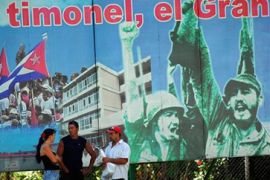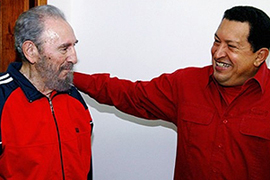Cuba without Fidel Castro
Latin America mulls future minus the veteran leader.

 |
| Many find it hard to imagine the region without a figure such as Fidel Castro [EPA] |
The news of Fidel Castro’s official retirement made front page news everywhere, but nowhere more so than in Latin America.
Countless newspaper and magazine articles continue to debate the ramifications of the region’s most renowned and controversial figure’s political exit.
For many, it is still hard to imagine a region without Castro playing a role – either as a communist villain or as the inspiration of real or would-be revolutionaries.
In Argentina, the birthplace of that other revolutionary icon Ernesto Che Guevara, most people are curious about what will happen next in Cuba under a new leadership to be named on Sunday.
It presumably will have Castro’s younger brother Raul, 75, at the helm.
While the United States demands that the new Cuban leadership implement “free elections and democratic reforms” before establishing any type of dialogue or relationship with Havana, in Latin America there is no question that governments will maintain and even attempt to improve their ties with whoever takes over.
Venezuela ties
Castro’s closest ally and regional political heir Hugo Chavez, president of Venezuela, is believed to have known about the Cuban leader’s decision long before it was made public.
“Fidel is not retiring. He will continue to occupy his place as the leader of our battle of ideas,” Chavez said.
 |
| Chavez, right, is seen as Castro’s political heir in the region [AFP] |
“His decision [not to continue as president] only increases his stature.”
Chavez’s close political and economic ties to Cuba will undoubtedly continue, even if the “chemistry” with Raul Castro is not the same as with his mentor, Fidel.
The other regional leader who is believed to have been tipped off in advance of the decision is Luiz Inacio Lula Da Silva, Brazil’s president and the last head of state to visit Castro before the announcement was made.
“I am very satisfied that Fidel says farewell [to the presidency] through a tranquil process. I was afraid of a turbulent withdrawal,” Lula said.
While close allies such as Bolivia, Ecuador, Nicaragua, Venezuela and Brazil are expressing nothing but praise for Castro, the governments of other Latin American nations that are more openly critical of Cuba’s one-party communist state, are refraining from sounding too cheerful.
Hoping for change
Not only because it is considered in poor taste, but because these countries hope to see progressive political and economic changes in Cuba.
And as everyone – except Washington – knows, the more you push the Cubans the more they go in the opposite direction.
“There should be no foreign interferences.” says Enrique Iglesias, a former Uruguayan foreign minister who is currently secretary-general of the Ibero-American Organisation.
“Cuba has to resolve its own transition problems.”
Lucia Newman is Al Jazeera’s Latin American editor